Search titles
Displaying results 11 to 20 of 33.

Making Mala »
Malaita in Solomon Islands, 1870s–1930s
Authored by: Clive Moore
Publication date: April 2017
Malaita is one of the major islands in the Solomons Archipelago and has the largest population in the Solomon Islands nation. Its people have an undeserved reputation for conservatism and aggression. Making Mala argues that in essence Malaitans are no different from other Solomon Islanders, and that their dominance, both in numbers and their place in the modern nation, can be explained through their recent history.
A grounding theme of the book is its argument that, far than being conservative, Malaitan religions and cultures have always been adaptable and have proved remarkably flexible in accommodating change. This has been the secret of Malaitan success.
Malaitans rocked the foundations of the British protectorate during the protonationalist Maasina Rule movement in the 1940s and the early 1950s, have heavily engaged in internal migration, particularly to urban areas, and were central to the ‘Tension Years’ between 1998 and 2003. Making Mala reassesses Malaita’s history, demolishes undeserved tropes and uses historical and cultural analyses to explain Malaitans’ place in the Solomon Islands nation today.
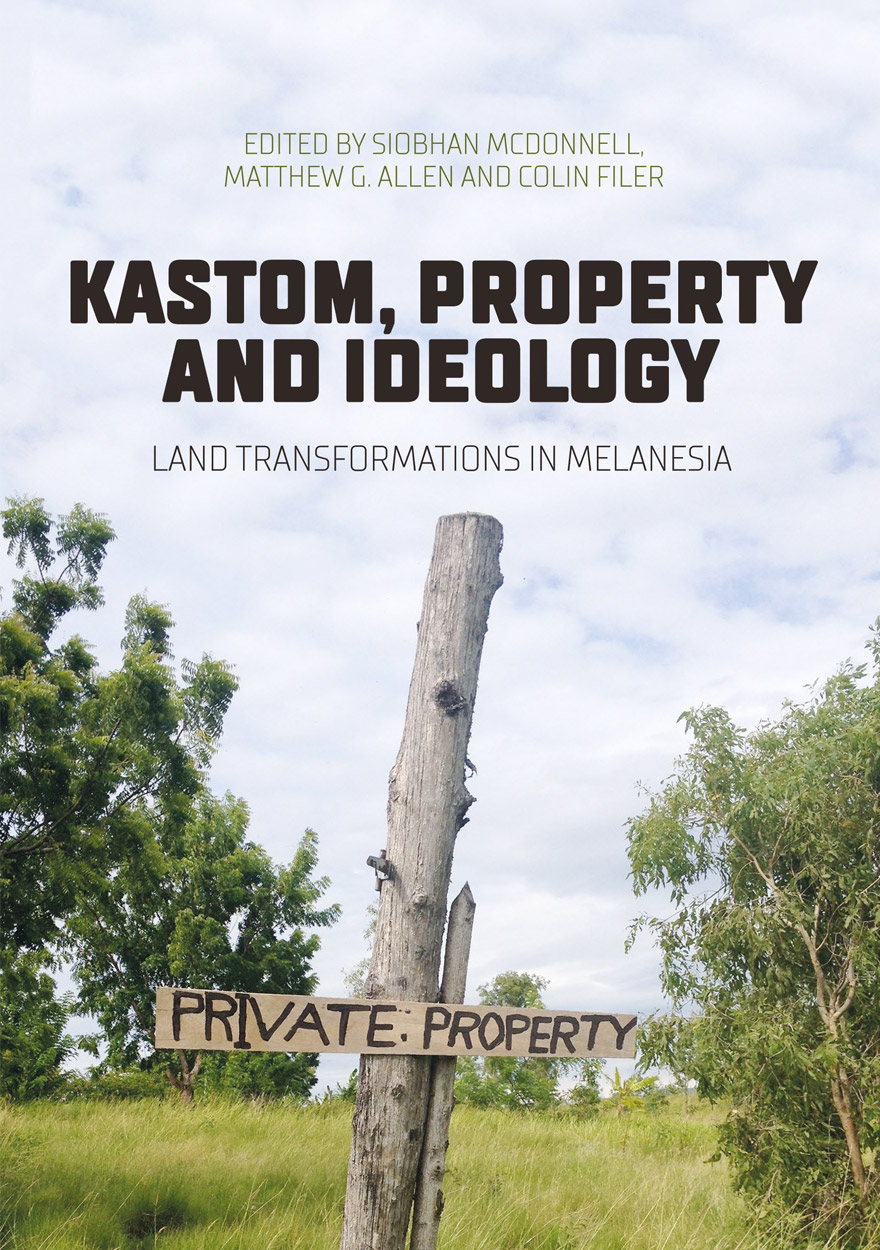
Kastom, property and ideology »
Land transformations in Melanesia
Publication date: March 2017
The relationship between customary land tenure and ‘modern’ forms of landed property has been a major political issue in the ‘Spearhead’ states of Melanesia since the late colonial period, and is even more pressing today, as the region is subject to its own version of what is described in the international literature as a new ‘land rush’ or ‘land grab’ in developing countries. This volume aims to test the application of one particular theoretical framework to the Melanesian version of this phenomenon, which is the framework put forward by Derek Hall, Philip Hirsch and Tania Murray Li in their 2011 book, Powers of Exclusion: Land Dilemmas in Southeast Asia. Since that framework emerged from studies of the agrarian transition in Southeast Asia, the key question addressed in this volume is whether ‘land transformations’ in Melanesia are proceeding in a similar direction, or whether they take a somewhat different form because of the particular nature of Melanesian political economies or social institutions. The contributors to this volume all deal with this question from the point of view of their own direct engagement with different aspects of the land policy process in particular countries. Aside from discussion of the agrarian transition in Melanesia, particular attention is also paid to the growing problem of land access in urban areas and the gendered nature of landed property relations in this region.
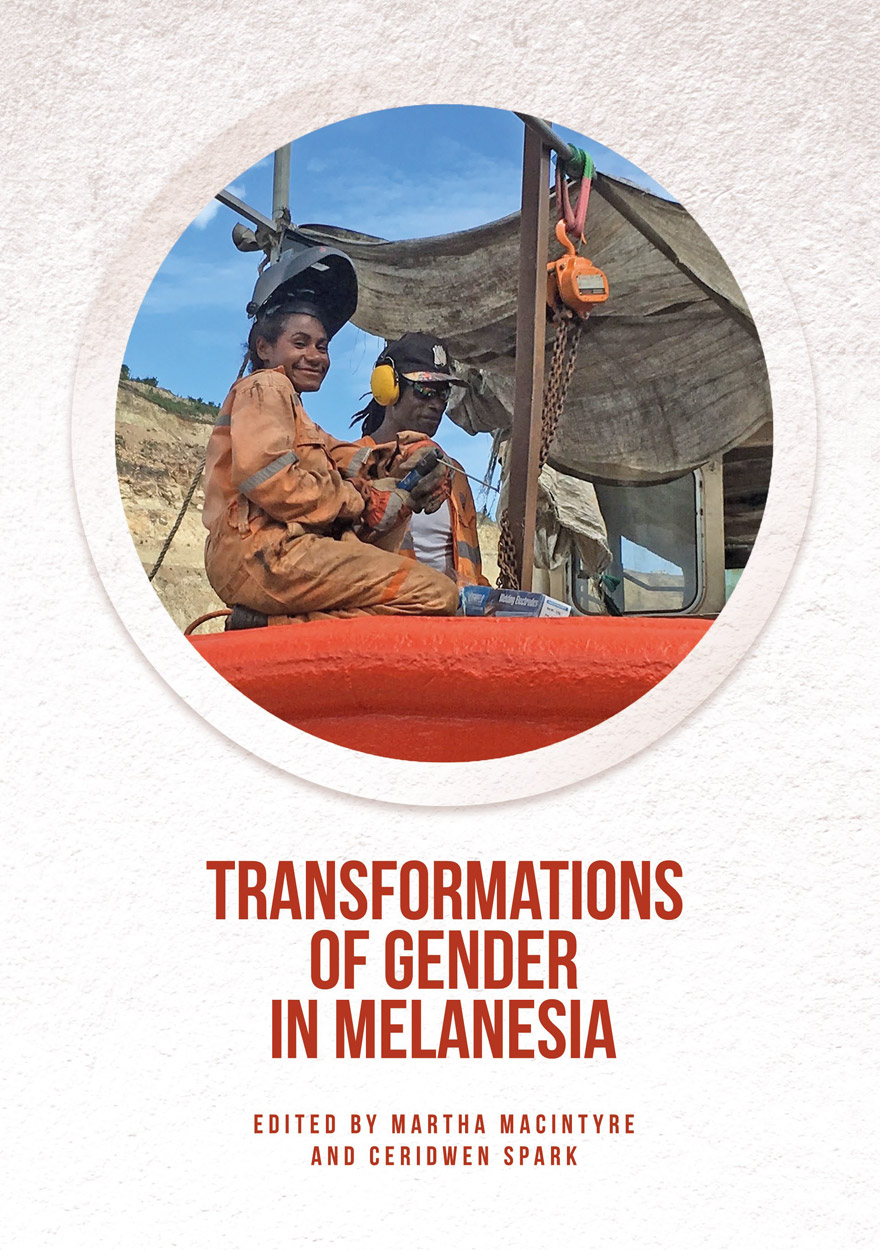
Transformations of Gender in Melanesia »
Edited by: Martha Macintyre, Ceridwen Spark
Publication date: February 2017
Despite the plethora of research on gender and the many projects designed to improve their status in the Pacific region, women continue to be disadvantaged and marginalised in social, economic and political spheres. How are we to understand this and what does it mean for researchers, policy-makers and development practitioners?
This book examines these questions, partly by looking back but also by continuing the effort to explain and understand gender inequities in the Pacific through reference to the concept of societies in transition. The contributors discuss emerging masculinities and femininities in the Pacific in order to chart the development of these in their contexts. Exploring how contemporary Pacific identities are shaped by local contexts and traditions, they focus on how these are remade through interaction with global ideas, images and practices, including new forms of Christianity and economic transformations. Grounded in recent, original research in both the villages and towns of Melanesia, the collection engages with the study of gender in Melanesia as well as scholarship on global modernities.
‘This collection is a welcome addition to the study of gender in Melanesia … Collectively, the essays present complex, locally contextualised and regionally situated case studies of gender transformation occurring alongside, in many instances, the re-codification of hegemonic gendered norms and practices. Gender is not understood as simply code for women in this volume rather, the majority of chapters incorporate men and masculinities in their analysis of gender relations and dynamics. A highlight of the collection is the attention paid to how “the politics of tradition” (and of modernity) are expressed through morally loaded concepts of the “good” or “bad” woman or man and vice versa.’
— Kalissa Alexeyeff, University of Melbourne
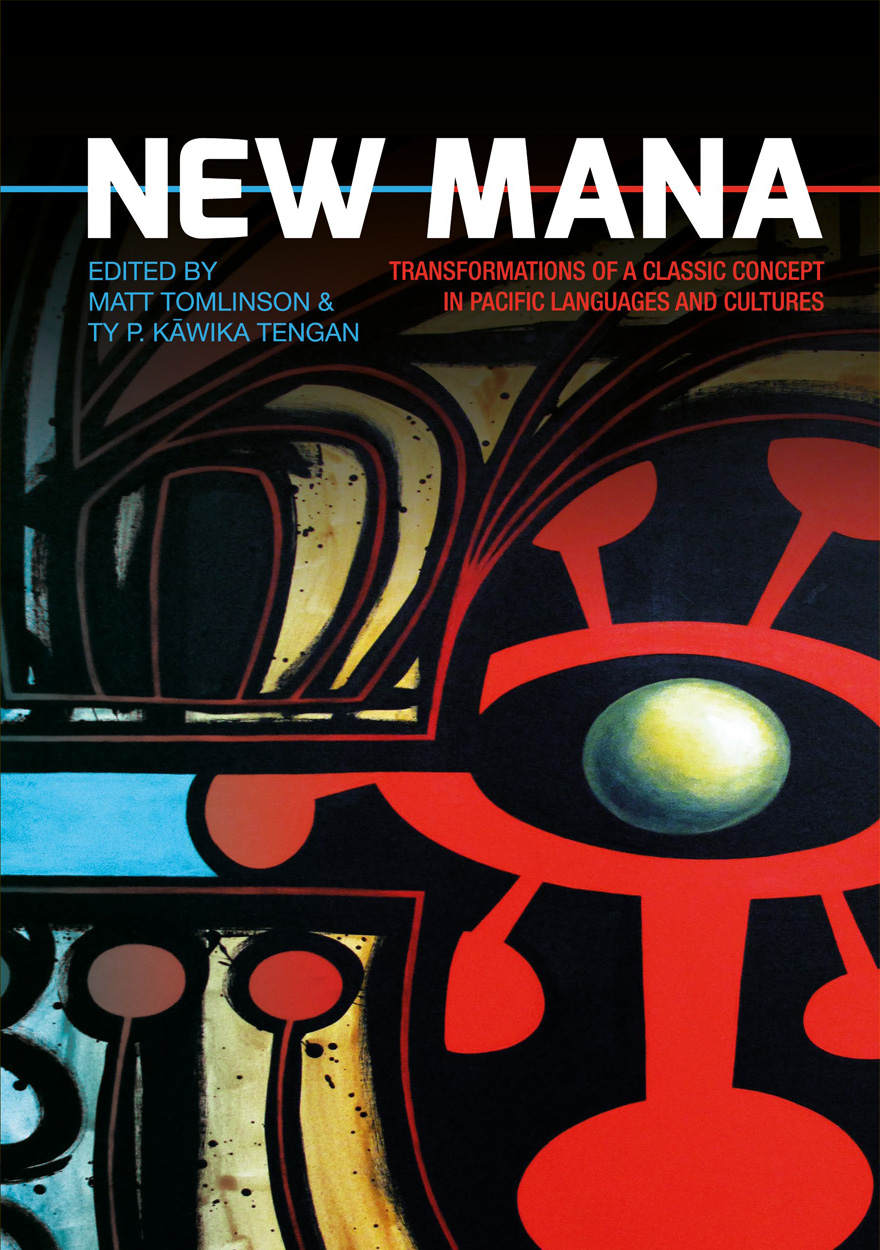
New Mana »
Transformations of a Classic Concept in Pacific Languages and Cultures
Edited by: Matt Tomlinson, Ty P. Kāwika Tengan
Publication date: April 2016
‘Mana’, a term denoting spiritual power, is found in many Pacific Islands languages. In recent decades, the term has been taken up in New Age movements and online fantasy gaming. In this book, 16 contributors examine mana through ethnographic, linguistic, and historical lenses to understand its transformations in past and present. The authors consider a range of contexts including Indigenous sovereignty movements, Christian missions and Bible translations, the commodification of cultural heritage, and the dynamics of diaspora. Their investigations move across diverse island groups—Papua New Guinea, Solomon Islands, Vanuatu, Fiji, Tonga, Samoa, Hawai‘i, and French Polynesia—and into Australia, North America and even cyberspace. A key insight that the volume develops is that mana can be analysed most productively by paying close attention to its ethical and aesthetic dimensions.
Since the late nineteenth century, mana has been an object of intense scholarly interest. Writers in many fields including anthropology, linguistics, history, religion, philosophy, and missiology have long debated how the term should best be understood. The authors in this volume review mana’s complex intellectual history but also describe the remarkable transformations going on in the present day as scholars, activists, church leaders, artists, and entrepreneurs take up mana in new ways.

Tropical Forests Of Oceania »
Anthropological Perspectives
Edited by: Joshua A. Bell, Paige West, Colin Filer
Publication date: August 2015
The tropical forests of Oceania are an enduring source of concern for indigenous communities, for the migrants who move to them, for the states that encompass them within their borders, for the multilateral institutions and aid agencies, and for the non-governmental organisations that focus on their conservation. Grounded in the perspective of political ecology, contributors to this volume approach forests as socially alive spaces produced by a confluence of local histories and global circulations. In doing so, they collectively explore the multiple ways in which these forests come into view and therefore into being. Exploring the local dynamics within and around these forests provides an insight into regional issues that have global resonance. Intertwined as they are with cosmological beliefs and livelihoods, as sites of biodiversity and Western desire, these forests have been and are still being transformed by the interaction of foreign and local entities. Focusing on case studies from Papua New Guinea, the Solomon Islands and the Gambier Islands, this volume brings new perspectives on how Pacific Islanders continue to creatively engage with the various processes at play in and around their forests.

Political Life Writing in the Pacific »
Reflections on Practice
Edited by: Jack Corbett, Brij V. Lal
Publication date: July 2015
This book aims to reflect on the experiential side of writing political lives in the Pacific region. The collection touches on aspects of the life writing art that are particularly pertinent to political figures: public perception and ideology; identifying important political successes and policy initiatives; grappling with issues like corruption and age-old political science questions about leadership and ‘dirty hands’. These are general themes but they take on a particular significance in the Pacific context and so the contributions explore these themes in relation to patterns of colonisation and the memory of independence; issues elliptically captured by terms like ‘culture’ and ‘tradition’; the nature of ‘self’ presented in Pacific life writing; and the tendency for many of these texts to be written by ‘outsiders’, or at least the increasingly contested nature of what that term means.
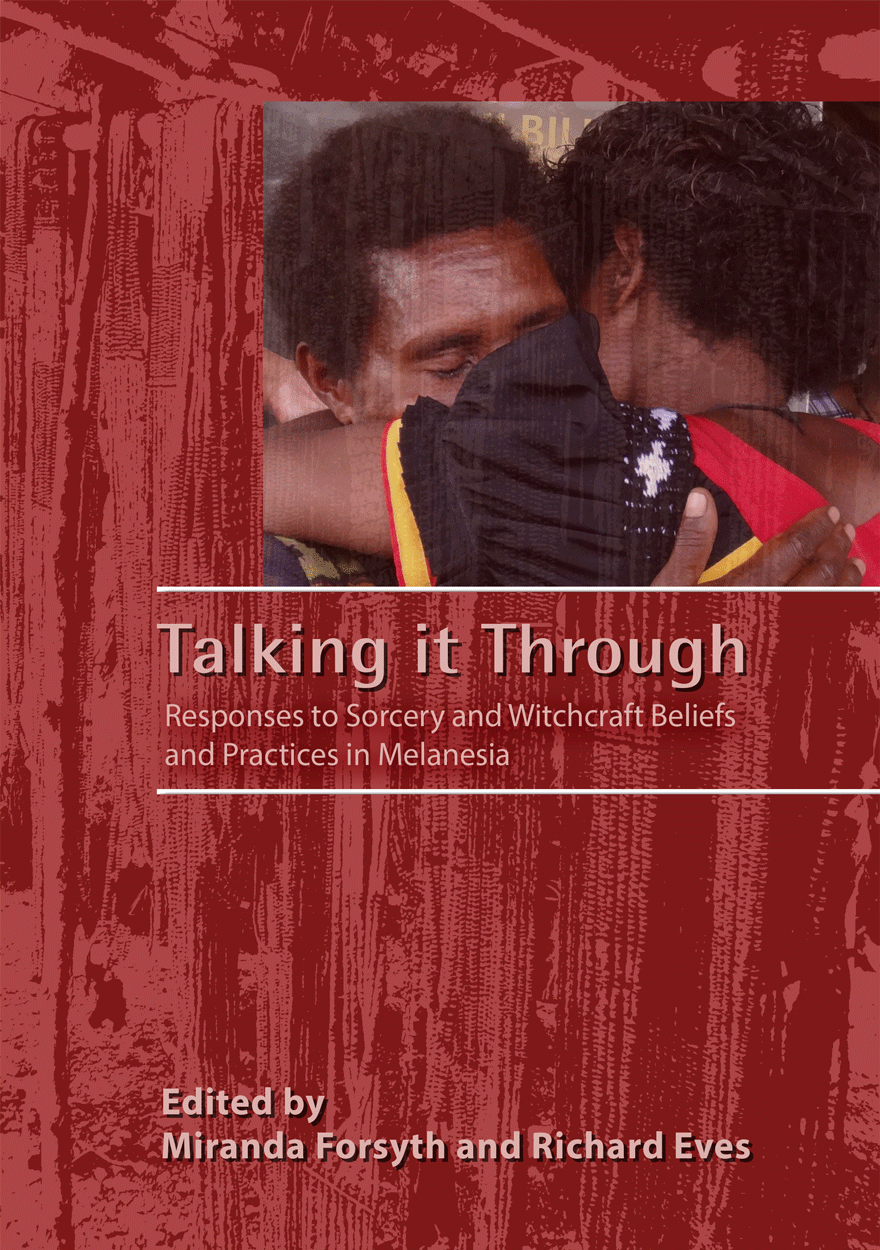
Talking it Through »
Responses to Sorcery and Witchcraft Beliefs and Practices in Melanesia
Edited by: Miranda Forsyth, Richard Eves
Publication date: May 2015
Sorcery and witchcraft practices and beliefs are pervasive across Melanesia. They are in part created by, and give rise to, a wide variety of poor social and developmental outcomes. These include uneven economic development, low public health, lack of social cohesion, crime, fear and insecurity. A further very visible problem is the attacks on men and women who are accused of being practitioners of witchcraft or sorcery, which can lead to serious bodily harm, banishment and sometimes death. Today, many communities, individuals, church organisations and policymakers in Melanesia and internationally are exploring ways to overcome the negative social outcomes associated with witchcraft and sorcery practices and beliefs. This book brings together a collection of chapters written by a diverse range of authors, both Melanesian and non-Melanesian, providing crucial insights both into how these practices and beliefs are playing out in contemporary Melanesia, and also the types of interventions that are being trialled or debated to address the problems associated with them.
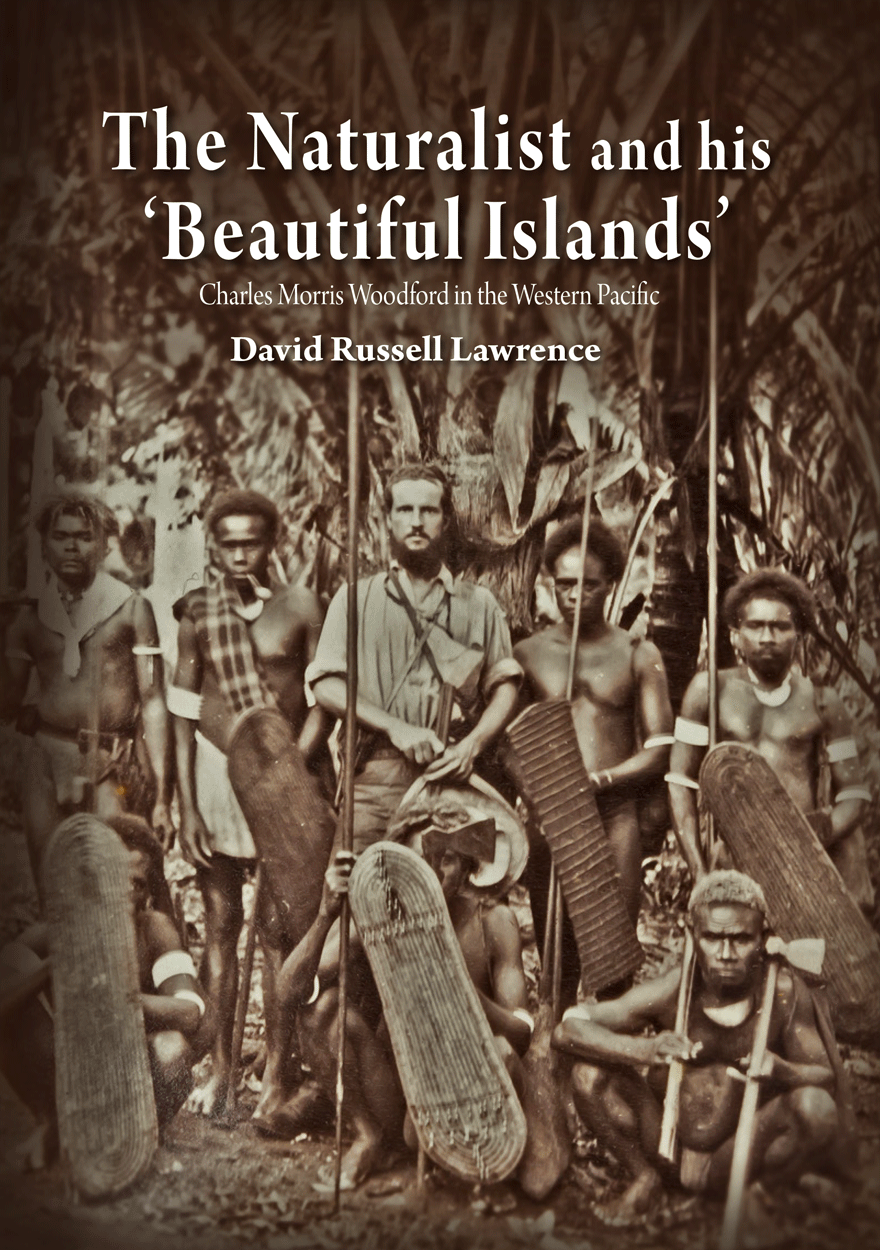
The Naturalist and his 'Beautiful Islands' »
Charles Morris Woodford in the Western Pacific
Authored by: David Russell Lawrence
Publication date: October 2014
‘I know no place where firm and paternal government would sooner produce beneficial results then in the Solomons … Here is an object worthy indeed the devotion of one’s life’.
Charles Morris Woodford devoted his working life to pursuing this dream, becoming the first British Resident Commissioner in 1897 and remaining in office until 1915, establishing the colonial state almost singlehandedly. His career in the Pacific extended beyond the Solomon Islands. He worked briefly for the Western Pacific High Commission in Fiji, was a temporary consul in Samoa, and travelled as a Government Agent on a small labour vessel returning indentured workers to the Gilbert Islands.
As an independent naturalist he made three successful expeditions to the islands, and even climbed Mt Popomanaseu, the highest mountain in Guadalcanal. However, his natural history collection of over 20,000 specimens, held by the British Museum of Natural History, has not been comprehensively examined. The British Solomon Islands Protectorate was established in order to control the Pacific Labour Trade and to counter possible expansion by French and German colonialists. It remaining an impoverished, largely neglected protectorate in the Western Pacific whose economic importance was large-scale copra production, with its copra considered the second-worst in the world.
This book is a study of Woodford, the man, and what drove his desire to establish a colonial protectorate in the Solomon Islands. In doing so, it also addresses ongoing issues: not so much why the independent state broke down, but how imperfectly it was put together in the first place.
David Russell Lawrence is an anthropologist who has managed environmental programs in Melanesia and Southeast Asia for the Great Barrier Reef Marine Park Authority. His most recent book was a re-examination of the place in Melanesian anthropology of the Finnish sociologist Gunnar Landtman who spent two years working with the Kiwai people of the lower Fly estuary. He recently managed a large-scale survey of 300 communities in the Solomon Islands for the Community Sector Program and has assisted with a number of the annual RAMSI People’s Surveys in the islands. This work has given him insight into the colonial heritage of the Solomon Islands and a desire to tell the story of the establishment of the British Solomon Islands Protectorate through the eyes of the first Resident Commissioner, Charles Morris Woodford.

Divine Domesticities »
Christian Paradoxes in Asia and the Pacific
Edited by: Hyaeweol Choi, Margaret Jolly
Publication date: October 2014
Divine Domesticities: Christian Paradoxes in Asia and the Pacific fills a huge lacuna in the scholarly literature on missionaries in Asia/Pacific and is transnational history at its finest. Co-edited by two eminent scholars, this multidisciplinary volume, an outgrowth of several conferences/seminars, critically examines various encounters between western missionaries and indigenous women in the Pacific/Asia … Taken as a whole, this is a thought-provoking and an indispensable reference, not only for students of colonialism/imperialism but also for those of us who have an interest in transnational and gender history in general. The chapters are very clearly written, engaging, and remarkably accessible; the stories are compelling and the research is thorough. The illustrations are equally riveting and the bibliography is extremely useful.
—Theodore Jun Yoo, History Department, University of Hawai’i
The editors of this collection of papers have done an excellent job of creating a coherent set of case studies that address the diverse impacts of missionaries and Christianity on ‘domesticity’, and therefore on the women and children who were assumed to be the rightful inhabitants of that sphere … The introduction to the volume is beautifully written and sets up the rest of the volume in a comprehensive way. It explains the book’s aim to advance theoretical and methodological issues by exploring the role of missionary encounters in the development of modern domesticities; showing the agency of indigenous women in negotiating both change and continuity; and providing a wide range of case studies to show ‘breadth and complexity’ and the local and national specificities of engagements with both missionaries and modernity. My view is that all three aims are well and truly fulfilled.
—Helen Lee, Head, Sociology and Anthropology, La Trobe University, Melbourne

Fire Mountains of the Islands »
A History of Volcanic Eruptions and Disaster Management in Papua New Guinea and the Solomon Islands
Authored by: R. Wally Johnson
Publication date: December 2013
Volcanic eruptions have killed thousands of people and damaged homes, villages, infrastructure, subsistence gardens, and hunting and fishing grounds in Papua New Guinea and the Solomon Islands. The central business district of a town was destroyed by a volcanic eruption in the case of Rabaul in 1994. Volcanic disasters litter not only the recent written history of both countries—particularly Papua New Guinea—but are recorded in traditional stories as well. Furthermore, evidence for disastrous volcanic eruptions many times greater than any witnessed in historical times is to be found in the geological record. Volcanic risk is greater today than at any time previously because of larger, mainly sedentary populations on or near volcanoes in both countries. An attempt is made in this book to review what is known about past volcanic eruptions and disasters with a view to determining how best volcanic risk can be reduced today in this tectonically complex and volcanically threatening region.



